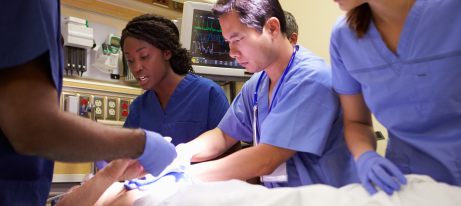
Clinical labs provide crucial information to emergency departments (ED), and together they provide better patient care when their individual workflows support mutual priorities. Two scientific sessions at the 71st AACC Annual Scientific Meeting & Clinical Lab Expo on August 5 explore this synergy between labs and EDs, discussing innovative strategies to achieve clinical excellence and improved outcomes in two different areas of patient care.
Value Added Partnerships between Clinical Laboratorians and Emergency Medicine Professionals to Improve Patient Care (32434) addresses the successful alignment of ED patient care goals with clinical laboratory medicine capabilities at one medical center. Session moderator Zhen Zhao, PhD, DABCC, FADLM, associate professor of clinical pathology and laboratory medicine at Weill Cornell Medicine in New York City, will share quality improvement projects in the ED and lab through problem-based learning and case studies. Her colleague at Weill Cornell, Peter Steel, MA, MBBS, director of clinical services for the department of emergency medicine, will discuss aligning ED goals with clinical lab capabilities, describing an effort to design and develop a community-based paramedic and telemedicine program.
Meanwhile, James Nichols, PhD, DBACC, FADLM, a professor of pathology, microbiology, and immunology at Vanderbilt University, will explore “on demand” point-of-care testing (POCT), specifically with respect to ambulance and helicopter testing in the field.
All three speakers will use the debate and/or skit formats to address the following topics:
- Reducing the high hemolysis rate in adult and pediatric ED populations;
- Streamlining the test add-on process in both clinical labs and EDs to reduce turnaround time, improve efficiency, and increase patient safety;
- Implementing mobile heartbeat for quick communication; and
- Using POCT in on-site and mobile EDs.
The session will take place from 12:30 to 2 p.m. and is worth 1.5 ACCENT credit hours.
Universal Non-Targeted HCV Screening and Linkage to Care: Emergency Department and Laboratory Perspectives on Design, Implementation, and Results (32105) will discuss the value UK HealthCare in Louisville, Kentucky, realized in establishing a nontargeted hepatitis C virus (HCV) screening program. Liver failure due to chronic HCV infection is the leading cause of liver transplantation in the United States, yet “with new direct acting antivirals, it is now more likely than ever that we can cure someone of this infection and make a real difference for not only the individual but also the health system as a whole,” session speaker Morgan McCoy, PhD, MD, an assistant professor with the University of Kentucky’s department of pathology and laboratory medicine, explained to CLN Stat. McCoy will be co-presenting with James Moore, MD, assistant medical director of emergency medicine with UK HealthCare.
At the outset of this project, the UK HealthCare ED worked with laboratory partners in planning for a successful launch. This was a multidisciplinary effort, involving information technology, ED clinical and administrative staff, and laboratory professionals, each bringing a slightly different perspective of the challenges and opportunities associated with the project, McCoy explained.
The laboratory had the task of providing rapid and accurate HCV test results to ED physicians while avoiding any unintended consequences to the quality of the remaining laboratory testing. “Having a full understanding of the challenges such a program will introduce in all sections of the laboratory, e.g. central processing, serology, molecular microbiology, etc. is key,” McCoy advised.
The session will take place from 10:30 a.m. to noon and is eligible for 1.5 ACCENT credit hours.
Attend both these scientific sessions at the 71st AACC Annual Scientific Meeting & Clinical Lab Expo in Anaheim, California, to consider practical strategies for labs and EDs to collaborate more effectively for the benefit of patient care.